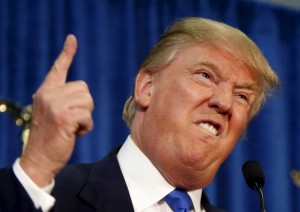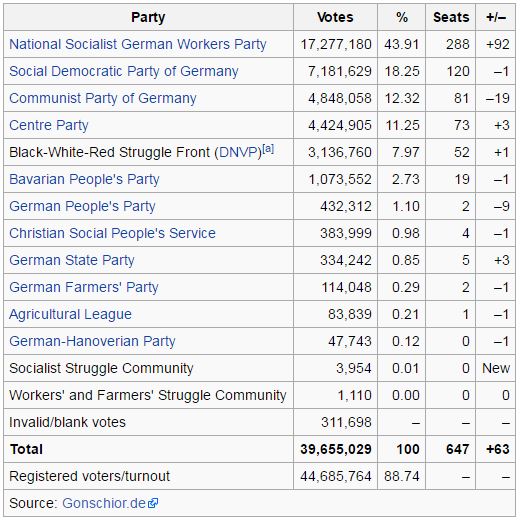I am NOT calling Trump Hitler — but I did notice an interesting election corollary
 Let me say up front that this column is not an embodiment of Godwin’s law, since I won’t say a thing here about Trump’s policy positions. I’m writing only because something Thomas Sowell wrote reminded me of an interesting historical fact that few people know about the elections that led to Nazi Germany.
Let me say up front that this column is not an embodiment of Godwin’s law, since I won’t say a thing here about Trump’s policy positions. I’m writing only because something Thomas Sowell wrote reminded me of an interesting historical fact that few people know about the elections that led to Nazi Germany.
Sowell’s most recent column attacks what he calls “the voice of the people fallacy,” under which Trump and his supporters assume that they speak for the majority of Republican voters:
We hear many fallacies in election years. The fallacy that seems to be most popular this year is that, if Donald Trump comes close to getting the 1,237 delegates required to become the Republican nominee, and that nomination goes instead to someone else, then the convention will have ignored “the voice of the people.”
Supposedly Republican voters would be outraged, many would stay home on election day, and some might even vote for the Democrats’ nominee, whether Hillary Clinton or Bernie Sanders.
Mr. Trump has more than once made the veiled threat that he would run as a third-party candidate if the Republicans failed to “respect” him. And of course Trump would himself decide what “respect” means.
Insofar as the voting public believes the fallacy that choosing someone other than Trump is ignoring “the voice of the people,” when Trump has the most delegates, his threat carries weight.
It’s this belief — that Trump holds the majority of Republican voters in the palm of his hand — that is behind Drudge’s headlines about Cruz stealing primaries and the threat of chaos at an unprecedented contested convention. Before I turn to the “voice of the people fallacy,” let me quickly address the “Cruz stealing delegates” and “unprecedented contested convention” fallacies.
Regarding Cruz’s recent delegate successes, the fact is that, unlike Trump, Cruz knew the rules and he played the better game under those rules:
Trump’s latest tantrum is over Colorado, where Ted Cruz just swept all 34 of the state’s available delegates. Trump is calling the results “totally unfair” and on Twitter he asked: “How is it possible that the people of the great State of Colorado never got to vote in the Republican Primary?” If Trump is so concerned about states’ not holding primaries, perhaps he should renounce his victory at Nevada’s caucuses.
Colorado is one of ten states and four territories that opted for caucuses or state conventions over primaries. That does not make it undemocratic. In fact, on March 1, in community centers, gymnasiums, and churches across the state, 60,000 Colorado Republicans attended 2,917 precinct caucuses to elect delegates to the county assemblies and congressional-district conventions that convened during the following weeks. The district conventions send 21 delegates to Cleveland; and at this weekend’s state convention, more than 600 people chosen by the county assemblies competed to be one of Colorado’s 13 statewide delegates. Nothing was “stolen.” This is how Colorado’s delegate-selection process works.
This information was not concealed from the Trump campaign; the rules have been available online since September. If Trump is upset with the results in the Centennial State, it’s his own fault.
Incidentally, I think that the current state of the Republican primary campaign is a microcosm of one of the main reasons that I support Cruz and not Trump: When things do not go Trump’s way, he cries and blames other people. When things do not go Cruz’s way, he analyzes the situation, creates a new strategy and, through good management, easily implements that strategy. I would rather have the latter temperament in the White House than the former.
The “unprecedented contested convention” claim is also erroneous. Republicans have experienced them before because they’re part of the process in a representative democracy:
The GOP has had ten contested conventions since it started holding national conventions in 1856. The first was 1860, when neither Abraham Lincoln or William Seward entered the convention with a majority of the delegates. It took Lincoln three ballots to secure the nomination.
James Garfield won the Republican nomination in 1880 after 36 ballots (a record for the party). His vanquished rivals included former president Ulysses S. Grant, who entered the convention with 40 percent of the Republican delegates but failed to secure the nomination.
Dwight Eisenhower entered the 1952 convention having won just 26.3 percent of the delegates in the primaries. But he still went on to win the nomination over Ohio Sen. Robert Taft in the last true brokered convention for either party.
The last contested convention took place in 1976, when Gerald Ford and Ronald Reagan both came close but failed to win enough delegates to clinch the nomination outright. Ford went on to win on the first ballot.
So, Cruz is playing by the rules, Trump is a crybaby/cry bully, and it’s perfectly reasonable to have a fight at the convention. Now I’ll return to the main point in this post, which is the fallacy behind Trump’s claim that he’s owed the nomination because “the people have spoken.” Sowell explains that this is a fallacy because not that many people have actually spoken when it comes to Trump:
In reality, Trump has never gotten a majority of the votes in any state. In other words, “the voice of the people” has been consistently against nominating Trump.
[snip]
If “the voice of the people” has spoken, whether in Wisconsin or nationally, what it has said repeatedly is “No” to Donald Trump. The illusion of Trump’s overwhelming appeal to the Republican voters has been maintained by the fragmenting of Republican votes, because so many candidates were running as conservatives that Trump won primaries without ever getting a majority of the votes.
This would not be the first time that the conservative-majority votes in a Republican-primary season have been split so many ways that someone who is not a conservative ends up with the nomination.
When I read that bit about a multitude of candidates leading to the political elevation of an extremist despite the latter’s support from only a minority of voters, I thought, “Gosh, that sounds familiar.” Then I remembered why:

That chart shows the election results in 1933. The election came shortly after the Nazis had unleashed a round of violence in Germany (something the less savory of Trump’s followers are threatening to do if the primary doesn’t go their way). Despite the violence, the Nazis in 1933 were still unable to muster a majority of votes — and yet they won. The problem was that those voters who opposed the Nazis could not coalesce around a single opposing party. Instead, they fragmented, giving Hitler and his fanatic followers the largest voting bloc (albeit one representing a minority of voters) and victory. It’s this kind of outcome that makes one appreciate America’s two-party system, isn’t it?
Again, I’m not comparing Trump’s policies to Hitler’s policies. I’m simply saying that, in a crowded electoral field, sometimes the candidate with the most fanatic following wins, not because the majority supports him (it obviously doesn’t in Trump’s case), but because he’s able to assemble the biggest voting bloc against a fragmented opposition.
